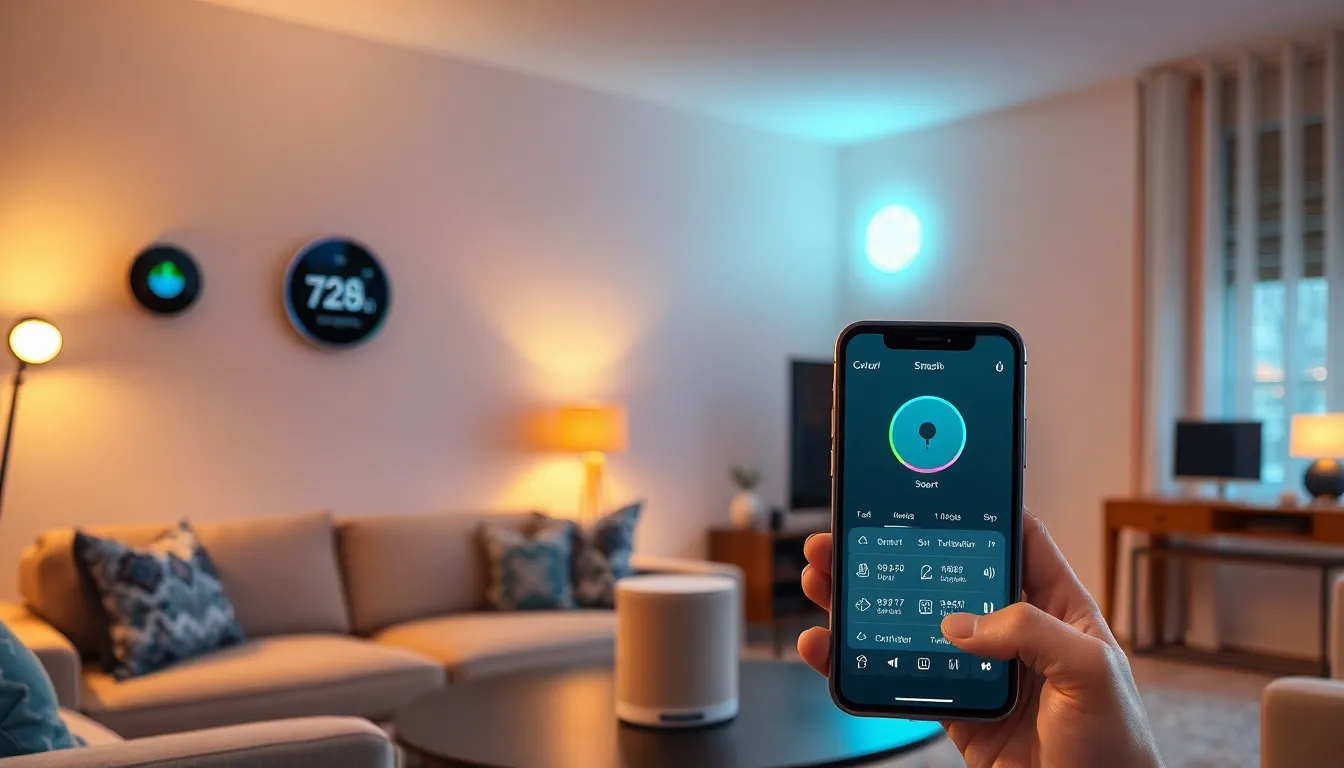Imagine walking into your home and having it greet you like a loyal butler. Smart home devices are transforming everyday living into a futuristic experience, where lights adjust to your mood and coffee brews just as you wake up. They’re not just gadgets; they’re your new best friends, ready to make life easier, safer, and a whole lot more fun.
From voice-activated assistants that respond to your every whim to thermostats that learn your schedule better than your mother, these devices are designed to simplify your world. Who wouldn’t want a home that anticipates their needs? With smart home technology, it’s like living in a sci-fi movie—minus the aliens and the awkward spacesuits. Dive into the world of smart home devices and discover how they can turn your castle into a tech-savvy sanctuary.
Table of Contents
ToggleOverview of Smart Home Devices
Smart home devices encompass a variety of technologies designed to enhance everyday living. These tools include smart speakers, security cameras, smart lights, and automated thermostats, all integrating seamlessly into home environments. Voice-activated assistants enable users to control these devices using simple commands. This connectivity allows for significant convenience and improves energy efficiency.
Automation plays a crucial role in smart homes. Devices can interact with each other through centralized hubs, creating a synchronized experience. Smart lights adjust brightness based on the time of day, while smart thermostats learn usage patterns to optimize heating and cooling. These features can lead to lower utility bills and increased comfort.
Safety and security are notable benefits of smart home technology. Surveillance cameras provide real-time alerts and recordings, while smart locks allow remote access and monitoring. Homeowners can receive notifications on their smartphones if unusual activity occurs, enhancing peace of mind.
Additionally, the integration of smart appliances enhances daily tasks. Refrigerators can track expiration dates, while washing machines can be controlled remotely via smartphones. Overall, smart home devices not only streamline household routines but also create a connected and intelligent living space.
Data from a recent study indicated that smart homes can reduce energy consumption by up to 30%. As technology evolves, more innovative features and functionalities are expected to emerge, further transforming residential environments. Investing in smart home technology enhances future living, making homes more enjoyable and efficient.
Types of Smart Home Devices

Smart home devices come in various forms, each serving distinct purposes to enhance daily life. These devices work together to make homes more efficient, secure, and enjoyable.
Smart Lighting
Smart lighting allows users to control lights remotely via mobile apps or voice commands. It enables customizable settings, such as adjusting brightness or changing colors. Automated lighting can sync with daily routines, turning on at sunset or mimicking occupancy while away. Integration with smart assistants streamlines user experience, making it easy to set moods for gatherings or relaxation. Energy-efficient LED bulbs significantly reduce electricity consumption, offering potential cost savings.
Smart Thermostats
Smart thermostats optimize heating and cooling systems to improve comfort. These devices learn user preferences, adjusting temperatures automatically based on routines. Users can monitor energy usage through connected apps, tracking savings over time. Many smart thermostats provide energy reports, suggesting ways to enhance efficiency. Given that effective usage may lower utility expenses by up to 30%, these devices contribute to both comfort and savings.
Smart Security Systems
Smart security systems offer comprehensive protection for homes. Surveillance cameras provide real-time monitoring, sending alerts to users about unusual activity. Smart locks enable remote access, allowing homeowners to control entry points through their smartphones. User-friendly interfaces often simplify the management of multiple devices, ensuring safety at all times. Many systems integrate with smart lights, creating the illusion of occupancy when residents are away, further deterring intruders.
Smart Assistants
Smart assistants serve as central hubs for managing various smart home devices. Voice-activated technology empowers users to issue commands effortlessly, controlling lights, thermostats, and security systems with simple phrases. Often equipped with advanced features, these assistants can provide reminders, answer questions, and manage daily tasks. Compatibility with numerous devices ensures seamless integration, making homes truly efficient. Their evolving capabilities promise to enhance user experiences as technology advances.
Benefits of Smart Home Devices
Smart home devices offer numerous advantages that enhance daily living. They provide a seamless blend of convenience, energy efficiency, and security.
Convenience and Automation
Convenience shines through with smart home devices transforming everyday tasks. Voice-activated assistants allow users to control multiple devices effortlessly. Automating tasks like adjusting lights based on daily routines makes life easier. Scheduling appliances further reduces the hassle of manual management. For instance, programming a coffee maker to brew at a specific time ensures morning readiness. Smart devices continually adapt to user preferences, creating a personalized living experience.
Energy Efficiency
Energy efficiency stands out as one of the primary benefits of smart home technology. Smart thermostats optimize heating and cooling based on usage patterns, contributing to substantial savings. Studies show homeowners can see reductions in energy bills by as much as 30%. Additionally, smart lighting systems utilize sensors to adjust brightness when needed, minimizing waste. These devices also provide insights into energy consumption, helping users make more informed decisions. Choosing energy-efficient models further enhances overall savings and environmental impact.
Enhanced Security
Enhanced security is a key advantage of integrating smart home devices. Smart security systems offer real-time monitoring through surveillance cameras. These cameras alert homeowners of any unusual activity, ensuring peace of mind. Remote access capabilities allow users to control locks and alarms from anywhere, adding a layer of protection. Further, smart doorbells enable video communication with visitors, promoting safety. Integrating sensors that detect smoke or water leaks enhances home safety, creating a more secure environment.
Challenges and Considerations
Smart home devices bring numerous benefits, yet certain challenges require attention. Addressing privacy concerns and compatibility issues stands essential for seamless integration and user trust.
Privacy Concerns
Smart home devices collect data to enhance functionality, raising significant privacy concerns. Security breaches could expose sensitive information to malicious actors. Users may feel uneasy with constant monitoring through cameras and sensors. Anonymity can diminish as personal data becomes more accessible. Implementing end-to-end encryption can mitigate these risks. Additional measures include regularly updating devices to fix vulnerabilities. Users can prioritize privacy settings within apps to control data sharing. Awareness around data usage also increases consumer confidence in adopting smart technologies.
Compatibility Issues
Compatibility issues frequently arise in smart home ecosystems. Not all devices communicate effectively with different brands and platforms. Standardized protocols like Zigbee and Z-Wave enhance integration but aren’t universally adopted. Users may face frustrations if devices can’t connect or work together smoothly. Investing in compatible hubs can streamline interactions between devices. Recognizing brand compatibility before purchasing devices helps avoid integration challenges. Regular software updates often improve compatibility between varying devices and systems. Overall, addressing these concerns supports a smoother smart home experience.
Smart home devices are reshaping how people live by offering unparalleled convenience and efficiency. With the ability to automate daily tasks and enhance security, these technologies create a seamless living experience. As homeowners embrace this innovation, they can enjoy significant energy savings and peace of mind.
While challenges like privacy concerns and compatibility issues exist, informed choices can lead to a smoother integration of smart devices. By prioritizing security and ensuring device compatibility, individuals can maximize the benefits of their smart home systems. Ultimately, investing in smart home technology not only elevates everyday living but also sets the stage for a more connected and efficient future.




